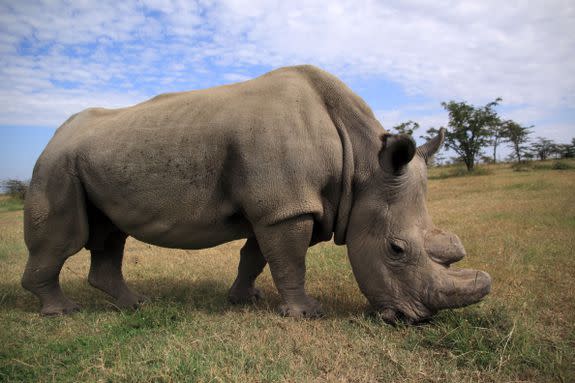Tinder wants you to swipe right on this rhino to help save his species

The world's most eligible bachelor is coming to Tinder — and he may not be who you expect.
In a new campaign launched Tuesday, Tinder has partnered with the Ol Pejeta Conservancy in central Kenya to introduce users to Sudan, the last known male northern white rhino in existence. The platform hopes to save Sudan's species from extinction.
SEE ALSO: 9 incredible ways we're using drones for social good
As the last hope for all northern white rhinos, 42-year-old Sudan is one of the most protected animals on the planet, surrounded by armed guards at all times. He lives at the conservancy with the only two female northern white rhinos, Najin and Fatu.
But he's been unable to breed with Najin and Fatu due to a number of issues, including old age and a low sperm count.

Image: Tinder
Through Sudan's Tinder profile — complete with an adorable profile photo — Tinder and the Ol Pejeta Conservancy hope to raise a hefty $9 million to fund in-vitro efforts in lieu of natural breeding to save the northern white rhino.
"As a platform that makes millions of meaningful connections every day, raising awareness about Sudan the Rhino and the importance of finding his match seemed like something we could support in a really impactful way," a Tinder spokesperson told Mashable. "We've heard countless stories about Tinder babies, but this would be the first match to save a species."
Any users who see ads on Tinder could potentially see Sudan the Rhino in their card stack. When users swipe right on Sudan, they'll receive a message that features a link to donate, which would help fund ongoing research focusing on "assisted reproductive technologies."
Scientists are currently testing ways to use in-vitro fertilization on Najin and Fatu, as well as female southern white rhinos with Sudan's stored sperm, hoping to achieve white rhino pregnancies to support population growth.
Southern white rhinos aren't endangered, but they are a different subspecies from northern white rhinos. These offspring, then, wouldn't be 100 percent northern white rhino, but experts say that option is better than extinction. And there are currently 17,000 southern white rhinos in existence, meaning chances of success are much higher.
White rhino populations around the globe have been severely threatened by poaching, with hundreds killed each year by illegal hunters. The animals are killed for their horns, which are traded illegally and used in traditional Asian medicines to treat a range of illnesses. They're particularly vulnerable to poaching because they're relatively unaggressive and travel in herds.

Image: Glyn Edmunds / REX / Shutterstock
If successful, this would be the first time scientists carry out artificial reproduction in rhinos. They hope to establish a herd of 10 northern white rhinos after five years.
"Saving the northern white rhinos is critical if we are to, one day, reintroduce rhinos back into Central Africa," said Richard Vigne, CEO of the Ol Pejeta Conservancy. "They contain unique genetic traits that confer upon them the ability to survive in this part of Africa. Ultimately, the aim will be to reintroduce a viable population of northern white rhino back into the wild, which is where their true value will be realized."
This isn't Tinder's first foray into supporting social good causes. Recently, the dating app let any user allocate $100 to a women-focused charity on International Women's Day. In 2014, the company partnered with Amnesty International to bring awareness to child and forced marriage around the globe through a series of in-app ads.
